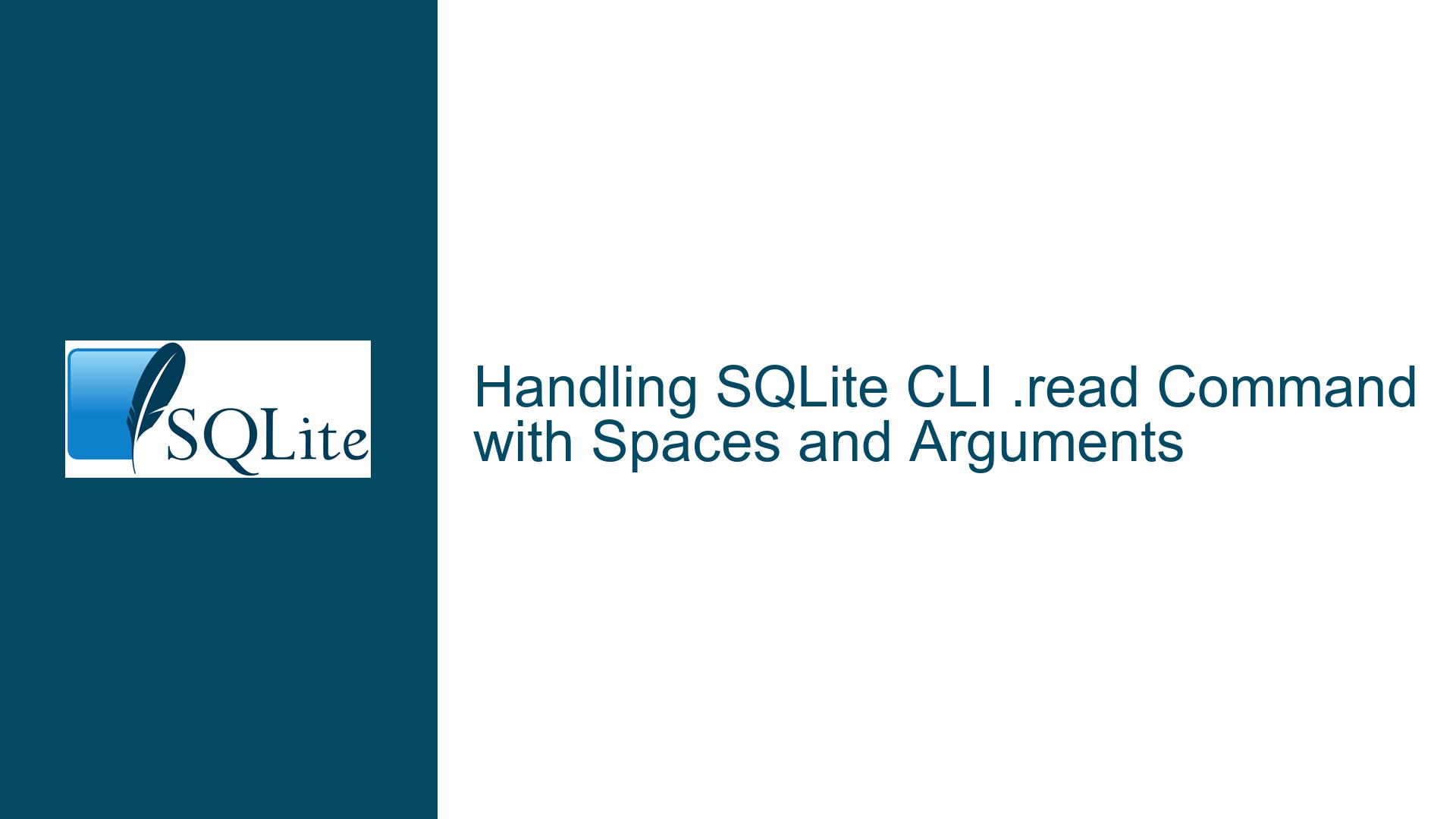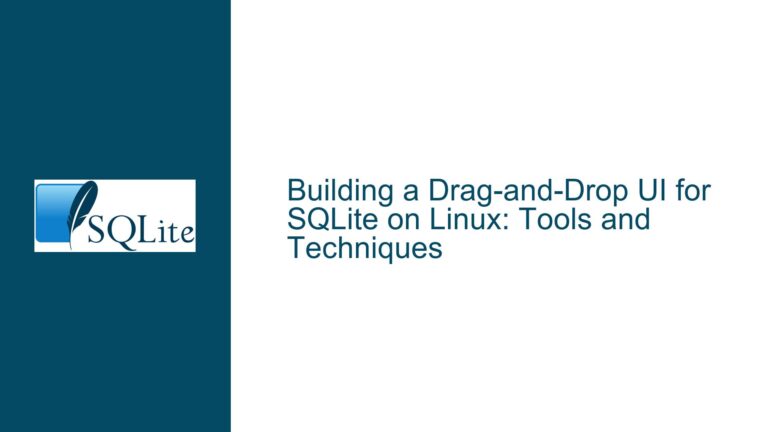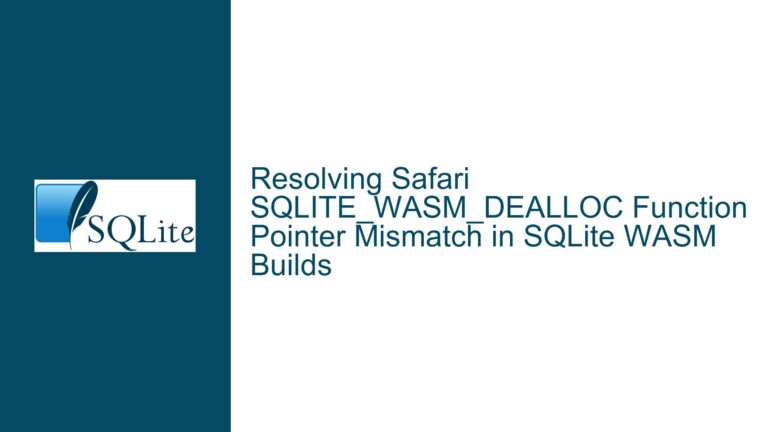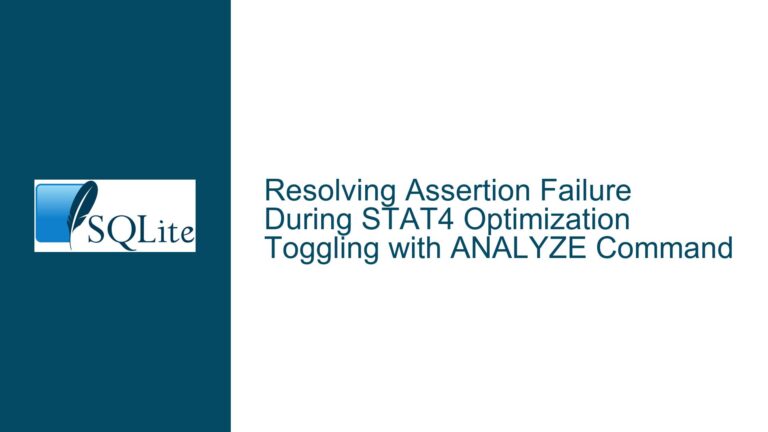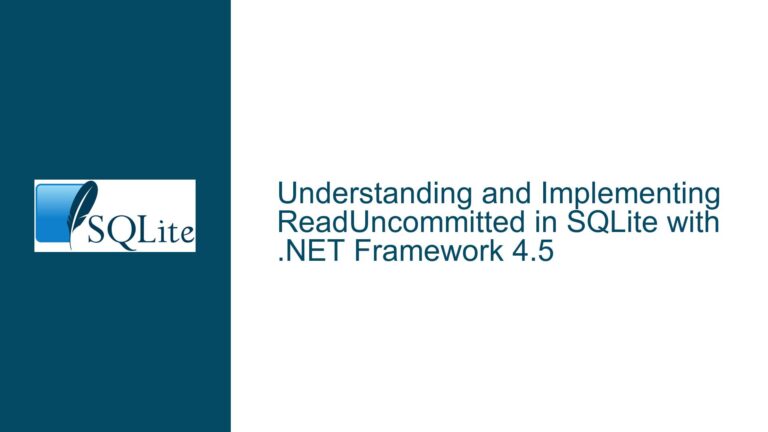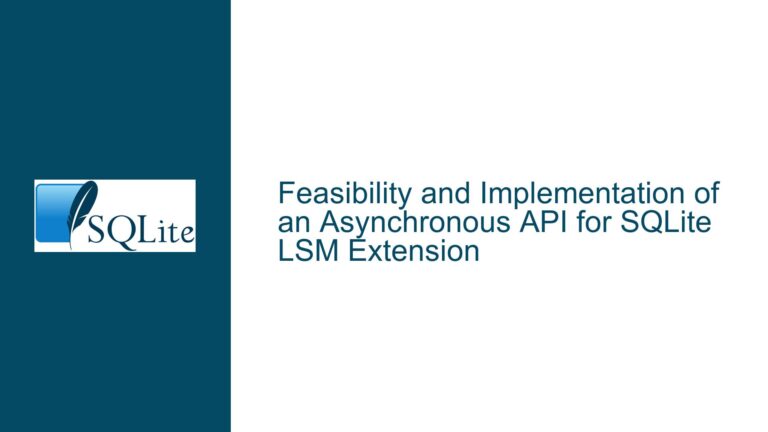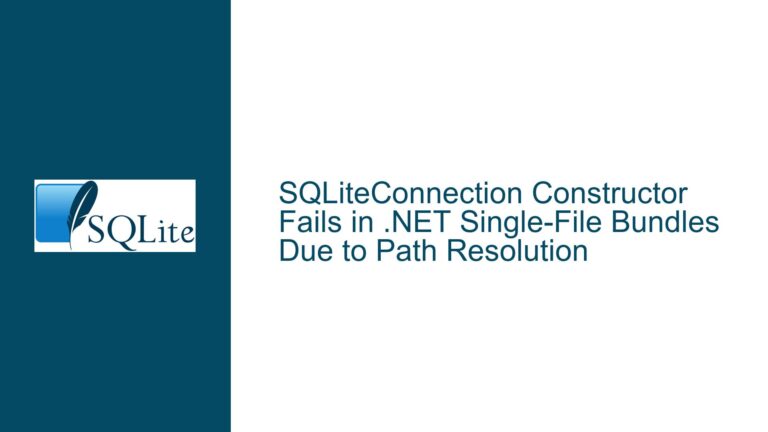Handling SQLite CLI .read Command with Spaces and Arguments
Understanding the .read Command Syntax and Argument Parsing Challenges
The SQLite Command Line Interface (CLI) provides a .read command to execute SQL statements from external files or dynamically generated scripts. A common use case involves reading SQL output from scripts whose filenames contain embedded spaces or require arguments. The core challenge arises from three interconnected factors:
- Argument Formation Rules: SQLite CLI follows specific lexical rules for parsing dot-command arguments, distinct from shell interpreters like Bash or PowerShell.
- Operating System Differences: Windows and Unix-like systems handle spaces in filenames and argument passing differently, requiring platform-specific quoting strategies.
- Pipe Operator Usage: The
|character in.read |"generator_script"serves as a directive to treat the subsequent argument as a command to execute, not as a literal file path. Its placement relative to quotes is critical.
Consider the following failed attempt to read from a script with spaces in its name:
.read |"my script.bat" -- Error: ".read" requires exactly one argument
This fails because the CLI parses |"my and script.bat" as separate arguments due to the space. The pipe operator must be part of a single lexical argument to trigger script execution mode.
Root Causes of .read Command Failures with Complex Filenames
Lexical Analysis of Dot-Command Arguments
SQLite CLI parses dot-command arguments using these rules:
- Arguments are whitespace-separated unless enclosed in quotes
- Single quotes (
') and double quotes (") are treated equivalently - Backslash is not an escape character (unlike Unix shells)
- The entire argument list is processed before the pipe operator (
|) is interpreted
This leads to parsing ambiguities when filenames contain spaces. The command:
.read |"C:/Program Files/script.bat"
Is split into two arguments: |"C:/Program and Files/script.bat". The CLI sees multiple arguments where only one is allowed.
Platform-Specific Path Handling
Windows applications typically accept paths with spaces when enclosed in double quotes:
"C:\Program Files\script.bat"
But in SQLite CLI, these quotes become part of the argument syntax rather than shell directives. A nested quoting strategy is required when combining CLI-level quoting with script execution.
Argument Propagation Through Pipes
When using .read |"script", the text after | is executed as a system command. Any arguments to the script must be encoded within the single argument passed to .read, creating a dual-layer quoting challenge:
- SQLite CLI argument parsing
- Target script’s argument parsing (e.g., Batch file, PowerShell, Bash)
Comprehensive Solutions for Robust .read Command Usage
Canonical Syntax for Filenames with Spaces
Windows Example:
.read '|"C:/Program Files/My Script.bat" "First Argument" "Second Argument"'
- Single quotes enclose the entire pipe command
- Double quotes wrap the script path and each argument
- Space preservation works at both CLI and script levels
Unix-like Systems:
.read '|/path/to/script.sh "Arg with space"'
- Single quotes prevent shell expansion (if invoked from shell)
- Double quotes preserve arguments with spaces within the script
Debugging Argument Parsing
Use these diagnostic techniques to verify argument handling:
- ECHO Testing
Create a test script (debug.baton Windows):
@echo OFF
echo CLI Arguments: %*
pause
Execute via SQLite CLI:
.read '|"debug.bat" "Hello World" "Another arg"'
Observe output:
CLI Arguments: "Hello World" "Another arg"
- SQLite Argument Logging
Temporarily modify the CLI source code to print argument vectors:
// In process_sqlite_command() function:
printf("Args count: %d\n", nArg);
for(int i=0; i<nArg; i++){
printf("Arg %d: [%s]\n", i, azArg[i]);
}
Advanced Argument Encoding Techniques
Nested Quoting for PowerShell Scripts
To pass arguments containing both spaces and quotes:
.read '|"powershell" "-Command" "& { .\script.ps1 '"""'String With Spaces'"""' }"'
Breaking down the quoting layers:
- Outer single quotes: SQLite CLI argument boundary
- Double quotes: PowerShell command specification
- Triple double quotes (
"""): Escaped single quote in PowerShell
Environment Variable Expansion
Leverage shell variables while maintaining platform compatibility:
.read '|"bash" "-c" "export TMPDIR=/tmp/with\ space; ./script.sh"'
The backslash before space is interpreted by bash, not SQLite CLI.
Platform-Specific Best Practices
Windows Batch File Special Cases
- CALL Syntax: Required when invoking batch files from SQLite CLI
.read '|"cmd" "/c" "call ""C:\Path With Spaces\script.bat"" arg1 ""arg 2"" "'
- Delayed Expansion: Handle exclamation marks in arguments
@echo off
setlocal enabledelayedexpansion
echo Received: %1
Unix Shell Script Considerations
- Shebang Line Robustness
Always include full path to interpreter:
#!/usr/bin/env bash
- IFS Handling
Prevent argument splitting by spaces:
SAVE_IFS=$IFS
IFS=$(printf "\n\b")
# Process arguments
IFS=$SAVE_IFS
Programmatic Script Generation Patterns
Python Example with Dynamic Arguments
Generate SQL from a Python script invoked via .read:
# gen_sql.py
import sys
table = sys.argv[1]
print(f"SELECT * FROM {table};")
SQLite CLI command:
.read '|"python" "gen_sql.py" "My Table"'
Secure Argument Sanitization
Prevent SQL injection when generating statements:
# Safe parameterization example
import sqlite3
table = sys.argv[1]
conn = sqlite3.connect(":memory:")
# Validate table name against schema
conn.execute(f"SELECT 1 FROM pragma_table_list WHERE name=?;", (table,))
Documentation Cross-Reference Guide
Key SQLite CLI documentation sections for .read command users:
Dot-Command Arguments
https://sqlite.org/cli.html#dot_command_arguments
Describes how arguments are lexically analyzed, including quote handling.File I/O Commands
https://sqlite.org/cli.html#file_i_o
Covers.readbasics but omits complex pipe usage examples.System Command Execution
https://sqlite.org/cli.html#system_command_execution
Explains the|operator’s role in dot commands.
Performance Optimization Strategies
- Batch Processing with Temporary Files
For scripts generating large SQL datasets:
.read '|"generator.bat" > temp.sql'
.read temp.sql
- Named Pipe Utilization (Unix-like Systems)
Avoid intermediate files via mkfifo:
mkfifo sql_pipe
generator_script > sql_pipe &
In SQLite CLI:
.read sql_pipe
Error Diagnosis Checklist
When .read commands fail, systematically check:
Argument Count Verification
Confirm exactly one argument is passed to.readusing diagnostic scripts.Quoting Layer Isolation
Test each quoting level separately:- SQLite CLI argument parsing
- Shell interpreter (cmd, PowerShell, bash)
- Script argument handling
Path Existence Validation
Use absolute paths during debugging to eliminate PATH environment issues:
.read '|"C:/full/path/to/script.bat"'
- Permission Auditing
Ensure SQLite CLI process has execute rights on the script and access to all directories in the path.
Cross-Platform Compatibility Table
| Scenario | Windows Command | Unix-like Command |
|---|---|---|
| Space in script path | `.read ‘ | "C:\Path With Spaces\script.bat"’` |
| Argument with space | `.read ‘ | script.bat "arg with space"’` |
| Nested quotes in arg | `.read ‘ | script.bat """quoted arg"""’` |
| Pipeline chaining | `.read ‘ | "script1.bat" |
Security Considerations
- Injection Prevention
Never directly interpolate user input into generated SQL:
# UNSAFE
print(f"INSERT INTO t VALUES ({user_input});")
# SAFE
print("INSERT INTO t VALUES (?);")
print(user_input)
- Execution Policy Restrictions
On Windows, PowerShell scripts may require policy adjustments:
Set-ExecutionPolicy -Scope Process -ExecutionPolicy Bypass
Historical Context and Design Philosophy
The .read command’s behavior stems from SQLite’s design principles:
Simplicity Over Convenience
Avoid complex argument parsing that would increase attack surface.Platform Agnosticism
Delegate OS-specific behaviors to the underlying system’s command processor.Composability
Enable integration with shell features rather than reimplementing them.
This philosophy explains why detailed pipe/quote examples aren’t in the core documentation – they represent combinations of independent features rather than .read-specific functionality.
This guide provides exhaustive coverage of .read command complexities, argument handling nuances, and cross-platform scripting strategies. Users should combine these techniques with systematic debugging practices to resolve filename spacing and argument passing issues in SQLite CLI operations.
